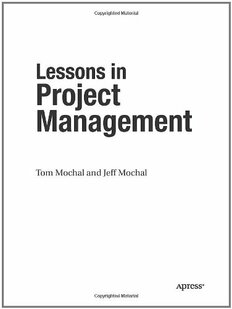
Lessons in Project Management PDF
240 Pages·2003·5.567 MB·English
Most books are stored in the elastic cloud where traffic is expensive. For this reason, we have a limit on daily download.
Preview Lessons in Project Management
Description:
Most of the project management books on the market are basically textbooks. They are dry to begin with and don't focus on the practical advice that most people need to run their projects. Lessons in Project Management does not assume you are a project manager building a nuclear reactor or sending a man to the moon. Instead, it focuses on the millions of people who manage normal, medium-to-large projects on an ongoing basis. Each case study in Lessons in Project Management contains accessible, easy-to-read case studies in real-world project management challenges. Each presentation of the problem is followed by an examination of the solution, written in easy-to-understand language. The format allows you to relate better to the book since it brings into play a project scenario with practical project management lessons to be learned. You'll also recognize recurring characters that appear in multiple stories and you'll start to develop some empathy and interest for their struggle. Table of Contents Understand the Characteristics of a Project Make Sure You Always Have an Identified and Committed Sponsor and Client Organization Report Status on All Projects (There Are Many Alternatives to the Format and Delivery) Focus on Deadline Dates First When Managing a Project Apply Some Level of Project Management Discipline— Even on Small Projects Define and Plan the Work First to Ensure Better Project Execution Don’t “Microbuild” or Micromanage the Workplan Manage Documents Properly to Avoid Confusion and Mix-Ups Define the Many Aspects of What Is in Scope and out of Scope Use the “Big Three” Documents—Project Definition, Project Workplan, and Requirements—As the Foundation for Your Project Use Scope Change Management to Allow the Sponsor to Make the Final Decision (Many Times the Sponsor Will Say “No”) Collect Metrics to Evaluate How Well You (and Your Project) Are Performing Save Knowledge for Future Projects, Leverage Knowledge from Prior Projects Ensure Issues Management Is Everyone’s Responsibility Shorten Long Meetings to Sharpen the Focus Identify the Root Cause of Problems, Especially If They Are Reoccurring Use Quality Assurance Techniques to Validate the Status of a Project Cancel Projects That Lose Business Support, Relevance, and Focus Use Risk Management to Respond to Problems Before They Occur Focus Your Quality Management on Processes, Not People Don’t Use Your Estimating Contingency for Scope Changes Develop a Communication Plan to Address Complex Communication Requirements Scale Your Project Management Processes Based on the Size of the Project Define and Plan the Project, Even If You Have to Start the Work at the Same Time Understand the Critical Path on Your Project and How This Path Drives the Deadline Date Change the Underlying Assumptions to Revise a Well-Prepared Estimate Don’t Shortchange Face-to-Face Communication on Your Project Make Sure Quality Is a Mindset and an Ongoing Process on Your Project Batch Small Scope Change Requests Together for Sponsor Approval Define the Overall Project Approach Before Building the Detailed Workplan Look for Risks Inherent to Your Project Before You Begin Get Sponsor Approval Before Investigating Large Scope Change Requests Make Sure the Cost of Collecting Metrics Does Not Exceed Their Value Use One or More Formal Techniques to Estimate Project Work Effort Keep Your Workplan Up to Date Throughout the Project Use Issues Management to Help Choose the Best of Bad Alternatives Collect Metrics That Can Lead to Fundamental Improvements Evaluate All Risk Response Options in the Risk Plan Gain a Common Understanding First to Effectively Manage Client Expectations Use Milestones in the Workplan to Track Overall Progress Establish Processes to Catch Errors As Early in the Project As Possible Gain Sponsor Approval for Scope Changes Requiring Budget and Deadline Changes Be Proactive in Applying Techniques to Accelerate the Project Schedule Use the Work Breakdown Structure Technique to Identify All the Work Required for a Project Write Your Status Reports with the Readers’ Interest in Mind Update Your Risk Plan Periodically Throughout the Project Don’t Practice Goldplating—Delivering More Than the Client Requested Make Sure One Person Is Responsible for Each Activity in the Workplan Focus on Your Deadline Date to Keep Your Project from Wandering Collect Metrics, but Gain Agreement on Their Significance Ahead of Time
See more
The list of books you might like
Most books are stored in the elastic cloud where traffic is expensive. For this reason, we have a limit on daily download.
